Having just arrived in Myanmar, I heard that the person who came to the airport to meet me was the regional director of Conch Cement in Myanmar. Wang Zhaowei, the executive chairman of Anhui Economic Journalists Association, could not help but joke to Li Xin, who was in his early 40s: Your team is the "second generation"!
"Eh?!" Li Xin is pondering the meaning of this sentence, President Wang explained with a smile: "Compared with the entrepreneurs of Conch in the early 1980s, you are not the second-generation entrepreneurs of Conch, the second overseas entrepreneurship.." He patted Li Xin on the shoulder and laughed heartily. The interview group's interview on Conch's investment and development in Myanmar began happily.
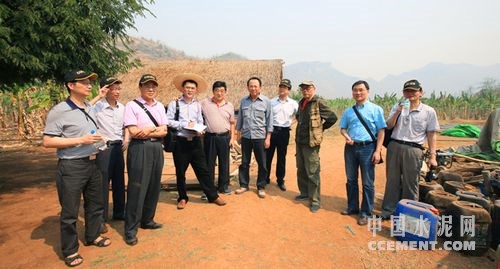
The delegation and Li Xin took photos at the site selection of Mandalay Cement Project.
Find a mine .
The mountain is always there. If you don't go, you will never find its treasure. Cement investors in many countries are planning to seize the virgin land of Myanmar and catch the early train of her economic opening and development.
On the outskirts of Mandalay, the green hills are like pillows.
The interview group drove eastward, and when they came to the foot of the mountain, they found that there was a large area of unusually flat open land surrounded by mountains. There are lush banana forests, two exploration rigs, three simple sheds, diesel engines and several pipelines in front of us. Although the site conditions are so simple, looking around is not particularly impressive, but in the eyes of cement experts, this is a geomantic treasure land for building a large cement clinker base.
Wang Shangyou, deputy general manager of Conch Myanmar, said that when Conch came to Myanmar to develop construction projects, the site selection requirements were very strict, there must be high-quality limestone resources, raw materials nearby, and cement could be easily transported out after putting into operation. After submitting the tender to the Ministry of Industry of Myanmar in October 2013, Li Xin and his prospecting team began to look for limestone mines suitable for the production needs of cement plants. He knew in his heart that only by controlling the resources could he make a comprehensive plan for the whole cement market in Myanmar. They looked at Google Maps first, and then visited and inquired. When they had some clues, they found a local guide, carrying a kettle, pickles, hot sauce, a hammer, under the scorching sun, in the mountains around Mandalay, drilling ravines, climbing mountains, cutting thorns, quarrying samples, and then determining the coordinates, and then sending the samples back to Yunnan for testing. After many setbacks, it was not until the site selection of the fifth mine was surveyed that it was finally a bit of a spectrum.

Site Selection for Mandalay Cement Project
In order to further understand the grade, reserves and distribution of mines, workers in China and Myanmar lifted tons of drilling rigs and climbed mountains along rugged paths to prepare for exploration operations.
The rig needs water to operate, and it can't do without water!
I finally found a small pool at the foot of the mountain. How can I get the water to the top of the mountain?
A diesel engine was found and connected to a water pipe, and the water went up the mountain section by section. If the water could not be pumped up the mountain at one time, it was connected to a water pump and transported up the mountain in stages.
But you have to live here. People have to eat and drink. Food can be bought and brought, but the water for eating is not good luck! After the shed, everyone found the answer. In the big frame of scaffolding is an open-air pool wrapped in tarpaulin, and the water for 50 or 60 people at the scene depends entirely on it.
"Don't look at the lack of water here, but it's really coming, and you can't stand it!" Li Xin said. Once I was looking for a mine, I climbed up a hill and was about to go down, but the hill was covered with overcast clouds. Without waiting to go down the mountain, there was thunder and lightning, and the rain poured down in a flash, and everyone's underwear was all wet.
After detailed survey, the amount of stone samples is very large, and it is inconvenient to transport all of them back to China for testing. So they bought a sample machine, crushed and ground the stone sample into stone powder, and then sent it to China for testing.
Hard work pays off. After obtaining the distribution and composition report of the whole mine, we finally confirmed that we had found a very suitable place to build a factory and saved a lot of expenses for prospecting.
According to the current exploration situation, the limestone reserves of this mine are estimated to be 150 million tons, less than 30 kilometers away from Mandalay City, and two production lines with a daily output of 5000 tons are planned to be built. Resources are precious. After the signing of the Mandalay Cement Project Cooperation Framework Agreement with MYINT Company, the site personnel acted quickly. At present, the drilling and sampling of the mine, the limestone mine and sandstone mine, and the site mapping of the main plant area have been completed.
Take the project.
Practice martial arts first, overseas development must first be grounded, find local partners to gain a firm foothold, get the project carrier to enter Myanmar, there may be further investment and development.
Myanmar's economy is underdeveloped, infrastructure is seriously deficient, and only some cement plants are poorly operated and managed, so the output and quality can not meet the needs of construction. Myanmar MYINT Investment Group sees this huge potential market and has been planning to develop cement projects for several years, but suffers from the lack of reliable partners. When they visited Conch Cement, they found that the cement clinker factories owned by Conch were not only large-scale and well-equipped, but also amazing in site management! After contacting and communicating with conch, the dedicated, efficient and professional spirit and style of conch people are also admirable and convincing, and finally they choose to cooperate with conch without hesitation. With this "guide" who is familiar with Myanmar's national conditions and proficient in social public relations, Conch's development in Myanmar is naturally like a fish in water.
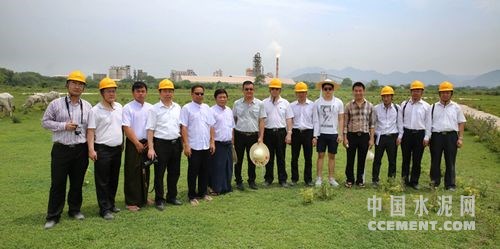
Group leaders and other partners to inspect the project
In 2013, the Myanmar government invited bids from all over the world for the entrusted operation of the Kyaukshi Cement Project under the Third Heavy Industry Group, the technical transformation of the 400t/d production line of the Kyaukshi Cement Plant, and the expansion of a 5000t/d production line.
After learning this information, Conch Cement and Myanmar MYINT Investment Group Company formed a consortium, the two sides cooperated and complemented each other, relying on the advantages of Conch to bid together. After a lot of meticulous preparations, the bid was successfully won on January 24, 2014.
In July 2014, Conch Cement formally set up a regional management committee in Myanmar to prepare for the construction of cement production lines, grinding stations, wharfs and other projects in Myanmar. On November 11, 2014, Myanmar Conch Cement Co., Ltd. obtained the temporary license issued by MIC; on November 13, Myanmar Conch Cement Co., Ltd. and the Ministry of Industry of Myanmar formally signed the BOT agreement of Kyaukshi Project (namely "Build-Operate-Transfer"); on November 15, Myanmar Conch Cement Co., Ltd. officially commenced the construction of 5000d/t cement clinker production line. On February 13, 2015, Myanmar Conch officially obtained the investment license issued by Myanmar MIC agency; on February 23, it obtained the production and operation license and import and export license of Myanmar Conch. So far, Conch has successfully taken root in Myanmar by contacting local partners. With the care and support of the Ministry of Industry of Myanmar, the Mandalay Provincial Government and the partners, the construction of the 5000t/d production line is also progressing in an orderly manner.
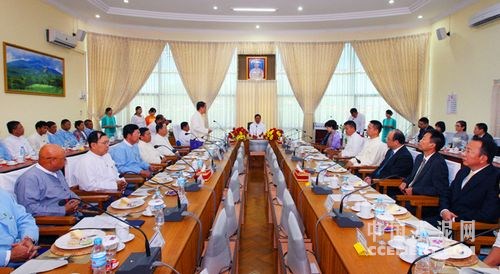
Through the joint efforts with MYINT Company, the partner of Myanmar, we have owned Jiaoshi Cement Project in Myanmar, and are preparing to build Mandalay Cement Project, Mandalay Wharf, Yangon and other project carriers. The wharf along the Irrawaddy River in Mandalay is mainly used to provide transportation channels for products and raw materials for Kyaukshi Cement Project and Mandalay Cement Project. Yangon Wharf Project will provide convenience for the landing, market transfer and distribution of cement in Yangon, which will effectively ensure the radiation of products and enhance the market competitiveness of products. Myanmar Regional Commissioner Liu Qingfeng said that Conch is working with Myanmar partners to inspect the shoreline and rear sites of the three major rivers in Yangon, and will soon finalize the best site. [Page]
Technical transformation .
Profit-making is the attribute of enterprises, but the transnational development of modern enterprises is by no means a simple "investment + making money". Conch "going out" firmly holds an idea: to export advanced management concepts and equipment technology, to promote local industry progress and economic growth, and to pursue long-term development and benefit.
On March 31, 2014, after signing the "Project Transition Agreement" with Myanmar Third Heavy Industry Group Company, the Conch Handover Working Group entered the site on April 1, and began handover work of asset inventory and personnel sorting.
It is true that "everything is difficult at the beginning". Kyaukshi Cement Plant belongs to the Third Heavy Industry Group Corporation under the Ministry of Industry of Myanmar, which can be regarded as a genuine state-owned enterprise in Myanmar. When it was taken over, 262 employees were all holding "iron rice bowls", and the difficulty of management can be imagined. When they first came here, the Burmese staff were all watching the Chinese staff work. If you called them, they would follow them for a while, but they would not take the initiative to do things.
Xia Xianqing, Regional Member of Myanmar and Deputy General Manager of Myanmar Conch, has worked in Conch Cement Production Line, Equipment and other management departments and Conch Building Material Design and Research Institute in China. But when he first arrived in Myanmar, he acted as a "foreman". He clearly remembered that when he first entered the production line of 400 tons per day in Jiaoshi Factory, the ground, handrails and stairs were covered with thick dust. When he went up to the kiln head, he was even more stunned-the kiln head cover was piled up with powder about the same volume as the whole cover. Originally, after the production line was put into operation, it leaked everywhere, and the dust had never been cleaned up.
"It must be cleared quickly!" The idea immediately came out of Xia Xianqing's mind like a submarine-launched missile. "If we don't clean up and resume production, the whole kiln hood is likely to collapse!"
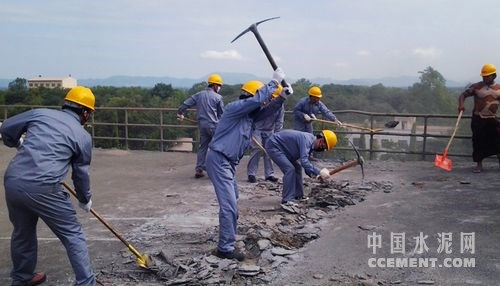
Conch management personnel and technical backbone entered the site to clean up the accumulated materials for many years.
The hidden dangers and environmental renovation of the old line site have become the primary task of the conch production recovery team. Xia Xianqing put on a dust mask and led the management and technical personnel of the conch to start cleaning up the accumulated materials in the kiln hood. Over the past few days, more than 2 tons of powder have been cleaned up. The kiln hood is refreshed, hidden dangers are eliminated, and the eyes of Burmese employees are more respectful. Subsequently, they made every effort to carry out on-site hidden danger treatment and environmental renovation of the 400t/d old line.
Nie Jianfeng, assistant general manager of Myanmar Conch, experienced a difficult "running-in period" when he first came to Myanmar, although he had a period of working experience in overseas general contracting projects. At that time, accommodation and other life were very hard, and the temperature in Myanmar was high, so I was sweating as soon as I arrived at the scene. The original equipment of the old line has been running for more than ten years, lacking maintenance, and there are many sudden failures of the equipment, so we have to rush to the scene whenever there is a problem. On the spot, the language is not clear and there are few translators, so they can only draw pictures on paper to communicate. Poor living conditions and difficult language communication are easy to overcome, while differences in management and other concepts are not so easy to overcome.
Originally, the zipper machine for conveying material powder was repaired when it was broken. Not long after it was repaired, it was broken again in other places, so it had to be shut down and repaired again. In this way, repair and turn again, break again, go round and round, a vicious circle. The disorderly management and passive remedy of the whole production line lead to the desperate situation of the production line operation management and the incurable disease of the factory operation. We also fully understand why the Ministry of Industry of Myanmar wants to invite tenders globally. Production organization and production line operation have reached the point where it is difficult to return. Without strong external force, it is difficult to reverse. Without standardized management and advanced technology, and without funds to start transformation, the factory will close down.
The employees of Myanmar are lucky. Li Xin said that after we came, we firmly followed the six-character policy of "mutual trust, tolerance and communication", fully trusted the partners, respected and actively integrated into Myanmar's culture, and attached importance to communication with Myanmar personnel. Conch staff work emphasizes planning, execution and work results, while Myanmar staff work at will and have a weak sense of urgency. At the beginning, when the two sides work together, they will inevitably "get angry and blush" when they disagree, but in the collision, communication and running-in of "the matter is not the person", the two sides gradually move towards mutual understanding, and the conch managers also explore feasible management and working methods.
On the basis of full exchange of views with Burmese personnel, combined with the whole-body CT diagnosis of the old line, Conch has developed a good prescription for technical renovation. They have compiled six major technical renovations of limestone stacker-reclaimer, air compressor, electric dust collector, coal mill, preheater and packaging machine, 144 self-maintenance and small technical renovations of cement mill, raw material mill and other process equipment, and invested 6 million yuan in the renovation. Let the old line be revitalized and give employees a safe, environmentally friendly and clean factory.

Production line with daily output of 400 tons in Jiaoshi Plant after technical transformation
In the first month after the technical reform, that is, in October 2014, the output and quality indicators of production and operation were significantly improved, and both production and sales in that month broke through 11000 tons, setting a new record for the past 12 years. On the basis of improving the efficiency of the factory, we will gradually increase the wages of employees. They also organized personnel to renovate the original out-of-service canteen of the factory, restore its use, repair the damaged tables and chairs of the production team, and improve the on-site production and logistical living conditions of the staff. Subsequently, some Myanmar staff were organized to visit Conch's cement plant in Yunnan in batches to understand the normal state of cement production and operation, receive training in technology, equipment principles and operation skills, and experience the production organization and living environment of modern factories. At this point, the Burmese staff realized that this group of conch workers from China came to work here, which really benefited the staff. Burmese personnel gradually accept and identify with conch management from their hearts, and when they encounter problems in production and operation, they begin to take the initiative to find Chinese personnel to find solutions together. The successful implementation of the recovery technical transformation of the 400t/d production line has also laid a good foundation for the promotion of the 5000t/d new line project. [Page]
Grasp construction.
If the technical transformation revitalizes the stock assets of the old line, then the 5000t/d new line project signed in the BOT agreement is a high-quality incremental asset with advanced equipment, environmental protection, energy saving and large scale.
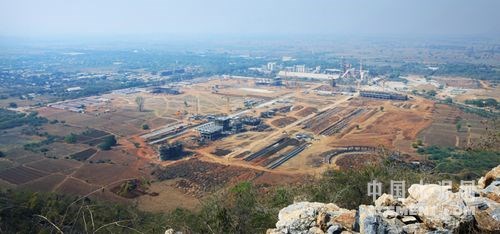
Main Works of New Line with Daily Output of 5,000 Tons of Jiaoshi Plant BOT Agreement Project
On November 13, 2014, the bot agreement of Jiaoshi Plant was formally signed, and on November 15, the main project of 5000t/d new line was officially started.
In China, Conch builds a production line with a daily output of 5000 tons, which is similar to a castle built by children playing with building blocks. Site selection, demonstration, planning, drawing, bidding.. The process is clear, the design Institute, the engineering department, the equipment department, the supply department and the owner unit are "five in one", the responsibility is clear and the operation is smooth. However, in Myanmar, far away from the headquarters, there is no support, as the rear area of Yunnan, after all, is also across the border. The domestic process method will not work if it is copied here.
Myanmar's industrial base is weak, building materials are scarce, steel, cement and other engineering materials and construction equipment have to be transported from home. Domestic steel procurement is not a problem, but after purchasing from a steel enterprise in Yunnan, we learned that Myanmar Customs does not collect taxes according to the contract amount, how can we pass the customs smoothly? How can it be transported to the project site after clearance? These things, which are nothing at home, have become problems here.
Zhu Lixue, deputy regional director of Myanmar, said with deep feeling, I have been working in Conch, participated in the construction of seven projects, and has been responsible for the development and mining management of mines, but I have never built a mixing station, and we have built it ourselves in Myanmar, which is the first time in Conch Group. Aggregate is indispensable for concrete, and we have built our own aggregate processing plant.
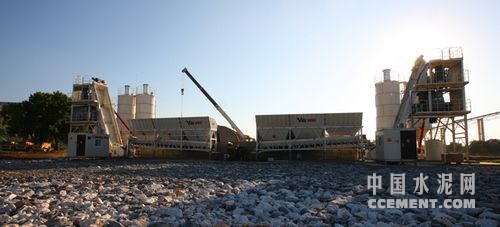
Self-built mixing plant
In order to do as the Romans do and avoid the acclimatization of cultural customs, Myanmar Conch pays attention to the society and actively integrates into the local area while working hard. In response to the local fund-raising activities, the company took the initiative to donate money to temples and pagodas in the industrial zone. In October 2014, after learning that some medicines were discontinued in the hospital of Jiaoshi Industrial Park, the company sent medicines to alleviate the problem of hospital medication; In December 2014 and March 2015, Myanmar Conch organized two on-site review meetings on environmental impact assessment and social review, and invited residents near the company to attend the meetings to answer their questions, and the project construction was supported by them. The company also invited Mr. Zhao Qihui, an official of the Chinese Consulate General in Mandalay, to visit the company and conduct special training on safety precautions for Chinese citizens working in Myanmar.
Conch advocates "living first, then producing", and the partners also try their best to provide better living conditions for the conch residents. But after all, entrepreneurship is in a foreign country, and the conditions are ultimately created by oneself. When the reporter was learning about the living conditions of the logistics, Zhang Long of the management department introduced: On June 1, 2014, I and the first batch of technical management backbones drawn from the group, a total of 12 people, went to Myanmar. Arrived at the Jiaoshi project site at 4:30 in the afternoon. Due to the lack of dormitories, everyone was arranged in the old houses in the park about 20 minutes away from the project department, and holes had appeared in the bamboo walls and roofs of some houses. Before I came here, I heard that Myanmar was short of electricity, but there was a power outage at dinner that night. The temperature at night is still 36 degrees, and I can't sleep at all. The self-made public water tank outside the house is empty, and there is no water to use, let alone take a bath. Fortunately, with the strong support of the group company and the partners, four temporary new bungalows have been put into use one after another, and the on-site office logistics conditions have been improved one after another.
At the beginning of the project construction, the Myanmar Project Department was located at the southeast side of the Kyaukshi Cement Plant, and the eight hospitality rooms of the original plant were used for office and living. Together with the personnel of the partners, there are more than 30 people here for meetings, work, meals and accommodation. There are eight tables in the canteen. We eat at half past six in the morning. After the meal, the staff consciously clean tables and then gather together to form a long table for the morning meeting. In this way, a busy day's work began with the company's morning meeting, and the professional groups reported the work of the day one after another. Seminars, weekly meetings and coordination meetings in the work are also held here. Accommodation is three people in a room, so crowded that only one person can walk between two beds, there is no wardrobe, mosquito nets are hung with wire, and personal belongings are placed in their own boxes. Such days lasted for about half a year, that is, under such living and office conditions, the preparation for construction was completed, and the project started only more than four months ago, most of which had the conditions for delivery and installation.
Asked about the experience of starting a business in Myanmar, Li Xin said: First of all, it is necessary to adapt to the national conditions of the investing country and act in accordance with local laws and rules. Secondly, we must coordinate the relationship between the market and the factory, the factory and the society, the conch and the partners, and the Chinese and Burmese personnel. With the gradual increase of project personnel, he realized that the most important thing in running a business is to manage people's hearts. Domestic employees volunteer to come overseas because they want to exercise themselves and do something. It is necessary to give him a platform for growth, to show his talents in entrepreneurship, and to maximize his personal value.
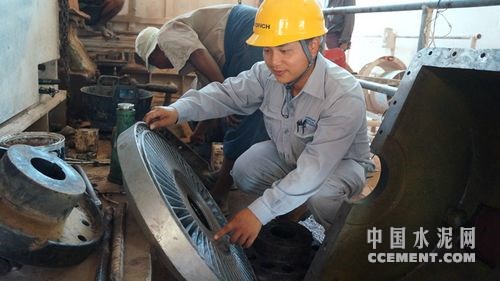
Tan Enmeng , Minister of Conch Production Technology of Myanmar
As the leader of Conch's entrepreneurship in Myanmar, Li Xin has begun to think about long-term development. Factory plates are very large, mixing stations and other industrial projects supporting the main industry, can we also try the form of mixed ownership economy, so that employees have the opportunity to invest in shares, and also realize the interests of enterprises and employees overseas. Let the employees who start their own businesses overseas have the opportunity to enjoy the fruits of the Group's overseas development, attract more outstanding talents to come overseas, and make everyone willing to work overseas for three or five years to ensure the construction and stable operation of the project.
Yes, overseas projects can not be separated from talents of various specialties. According to statistics, there are 31 technical backbones dispatched by Conch in the Myanmar Project Department, with an average age of 29 years, 20 married and 11 unmarried. When going abroad, there are wives who are pregnant, babies who are only half a year old, those who are in love and are about to hold a wedding, those who have just fallen in love.. Wang Guobing, graduated with a bachelor's degree in mechanical design, manufacturing and automation, joined Conch Group in 2007, went to Myanmar on November 18, 2014, and is currently the director of mechanical technology in the production technology department. Before departure, his wife had been pregnant for seven months; in the Spring Festival of 2015, he did not return home from Myanmar to escort the production of a material factory. In the early morning of March 1, his lovely son was born in Wuhu. At that time, he was also organizing personnel to carry out night equipment maintenance on the aggregate production line of Myanmar's 5000t/d project to ensure normal production during the day. The next day, he asked for leave from the company and returned home. He also had an operation in Wuhu during his vacation.
During the discussion with Myanmar conch managers, everyone spoke freely, and two sentences were particularly impressive:
"Conch goes out to develop, I am proud that I am one of them!"
"When the main work of the project is settled and the energy is freed up, we will have to carry kettles and hammers on our backs and take the team out for reconnaissance. The project comes out by running.."



 浙公网安备33010802003254号
浙公网安备33010802003254号